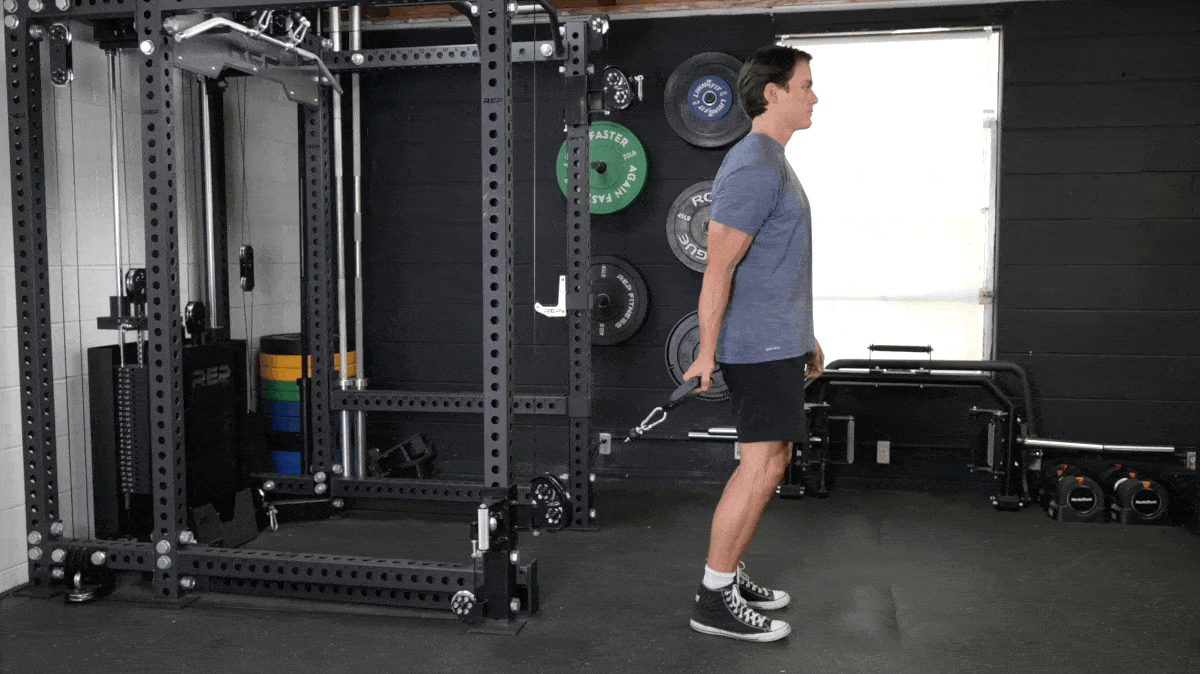Let’s be real; nobody has big enough biceps. We’re all aiming to be Arnold Schwarzenegger in one way or another. On Jun. 4, Dr. Mike Israetel of Renaissance Periodization and bodybuilder Jared Feather teamed up to explain and demonstrate the single best exercise for creating hypertrophy in stubborn biceps.
If you’re bored to death of barbell curls and feel like you need to spice up your arm workouts, this one is for you.
[Related: The 2 Best Biceps Exercises for Muscle Growth (According to a Pro Bodybuilding Coach)]
We’re going to break down Israetel’s rationale and teach you how to perform the TK with picture-perfect technique so your biceps can go from “stubborn” to “spectacular”.
The Best Exercise for Stubborn Biceps
“This exercise will give you multiple days of delayed-onset muscle soreness,” Israetel claims. Tall order, but we’re here for it — according to Dr. Israetel, the single best exercise for growing stubborn biceps is the lying dumbbell biceps curl.
How To Do It
| Equipment Needed | Weight bench, dumbbells |
| Muscles Worked | Biceps |
| Sets & Reps | 3 x 8-12 |
- Lie on your back on a flat bench with a dumbbell in each hand and your arms hanging off the sides, but not down so far that the weights rest on the floor.
- You may want to elevate the seat of the bench, if possible, to give your head some support.
- Curl the weights up by flexing your elbows until your forearms point toward the ceiling.
From the Expert: “You need to lower the weights slowly and under control because of the position this exercise puts your shoulders in,” Israetel notes. This movement requires a decent degree of shoulder extension — you may feel a significant stretch in your front deltoids and chest muscles.
Modifications: Israetel recommends holding your upper arms a bit higher if you’re experiencing shoulder pain during this exercise. Try tucking them snugly against your torso. There are also a number of similar movements that stress the biceps in a similar fashion if the supine dumbbell curl isn’t your cup of tea:
Both of these exercises involve applying maximal tension to the biceps when they’re fully or nearly fully lengthened.
Why It Works

[Read More: Best Biceps Exercises and Biceps Workouts for Strength]
Israetel and Feather are hopping aboard the long-length partial train in a big way with this unique biceps curl variation. The premise to this movement is simple; use a dumbbell to apply as much mechanical tension as possible to the biceps when they’re almost fully stretched out. Why?
- Studies on hypertrophy repeatedly show that mechanical tension, or how much torque you’re putting on the joint, is integral for muscle growth. (1)
- Further, a growing body of research on lengthened partials seems to suggest that applying mechanical tension to a muscle while it is stretched is more conducive to growth than when the muscle is shortened. (2)(3)
The lying dumbbell biceps curl leans into these elements in a big way. Free weights like dumbbells work against gravity, and tend to have inconsistent resistance curves as a result.
You’ll often find dumbbell exercises like the lateral raise very easy to begin with and very difficult to finish. This biceps curl variation puts all that tension on your arms while they’re stretched, doubling down on the growth potential.
More Bodybuilding News
- Bench Press Study: This Technique Adds +10 Pounds to Your Max
- “I Want To Be Michael Jordan”: Chris Bumstead Gives Olympia Prep Update
- Fat Loss Tips From Bodybuilder Erin Stern
References
- Schoenfeld B. J. (2010). The mechanisms of muscle hypertrophy and their application to resistance training. Journal of strength and conditioning research, 24(10), 2857–2872.
- Pedrosa, G. F., Simões, M. G., Figueiredo, M. O. C., Lacerda, L. T., Schoenfeld, B. J., Lima, F. V., Chagas, M. H., & Diniz, R. C. R. (2023). Training in the Initial Range of Motion Promotes Greater Muscle Adaptations Than at Final in the Arm Curl. Sports (Basel, Switzerland), 11(2), 39.
- Kassiano, W., Costa, B., Kunevaliki, G., Soares, D., Zacarias, G., Manske, I., Takaki, Y., Ruggiero, M. F., Stavinski, N., Francsuel, J., Tricoli, I., Carneiro, M. A. S., & Cyrino, E. S. (2023). Greater Gastrocnemius Muscle Hypertrophy After Partial Range of Motion Training Performed at Long Muscle Lengths. Journal of strength and conditioning research, 37(9), 1746–1753.
Featured Image: Renaissance Periodization / YouTube